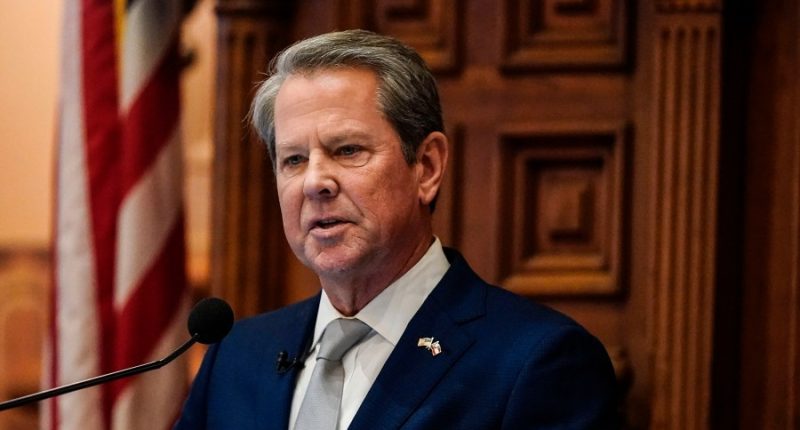Share this @internewscast.com

ATLANTA (AP) – Georgia’s Republican governor, Brian Kemp, announced on Monday that he will not be running for the U.S. Senate in 2026 against Jon Ossoff, the Democratic incumbent.
Kemp, who will step down as governor in 2027 after serving for eight years due to term limits, has consistently been considered a prime candidate by the GOP for challenging Ossoff, a prominent target for Republicans in the upcoming midterm elections. With Kemp’s decision not to enter the race, it is anticipated that there will be a fiercely contested primary among candidates who have yet to achieve a major statewide victory.
In a statement, Kemp mentioned, “I spoke with President Trump and Senate leadership earlier today and conveyed my commitment to collaborate with them to ensure we have a strong Republican nominee who can secure a win next November, ultimately serving as a conservative voice in the US Senate and prioritizing the needs of hardworking Georgians.”
U.S. Rep. Buddy Carter, who represents a district on Georgia’s coast, is itching to run and is likely to jump in. U.S. Reps. Mike Collins and Rich McCormick and Insurance Commissioner John King could also be possibilities.
A number of top-tier Republicans appear to have excluded themselves by taking top positions in President Donald Trump’s administration, including former U.S. Rep. Doug Collins, currently secretary of the Department of Veterans Affairs; former U.S. Sen. Kelly Loeffler, head of the Small Business Administration; and former U.S. Sen. David Perdue, ambassador-designate to China.
A possible candidate with massive name recognition is Rep. Marjorie Taylor Greene, a prolific fundraiser who may have gone as far as she can go in the House and was passed over for a position in the Trump administration. She has said she’s considering running for Senate or governor in 2026, but her entry into either race would likely prompt internal opposition from more traditional Republicans, including those aligned with Kemp.
National Republicans have already been advertising against Ossoff, who launched his reelection bid at a March rally where he proclaimed his defiance to Trump. He has tried to craft a role as a traditional senator who can work across the aisle and as a crusader against corruption and wrongdoing.
The election is likely to be closely contested and fantastically expensive. The twin Senate races in 2020, when Ossoff and Raphael Warnock narrowly won and flipped control of the body to Democrats, cost more than $900 million combined, according to OpenSecrets, which tracks political spending. Warnock’s 2022 reelection over Republican Herschel Walker cost more than $470 million, OpenSecrets found.
The 61-year-old Kemp hesitated for months about entering the race, seemingly reluctant to become one of 100 senators after years of charting his own course in executive office. That’s especially true as Trump, who once regarded Kemp as an enemy, stands astride the Republican Party.
Kemp has harbored ambitions to run for president and had faced questions about whether it would be better to do so as a senator or to follow in the footsteps of fellow Georgian Jimmy Carter and run as a successful former governor. Losing a Senate race would probably extinguish such hopes, but staying out could leave the door open to run directly for the White House after he leaves office.











